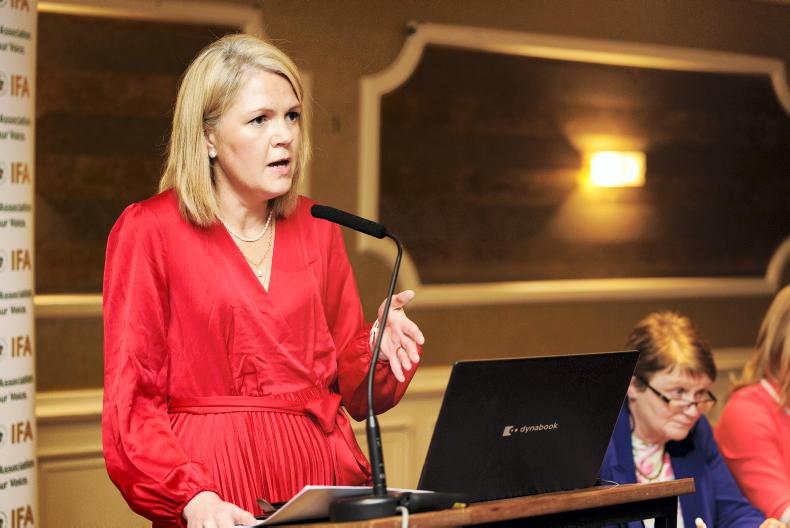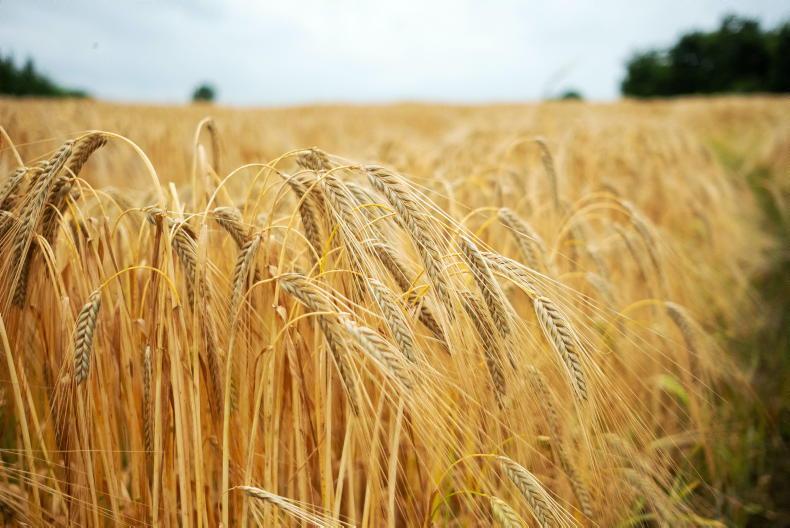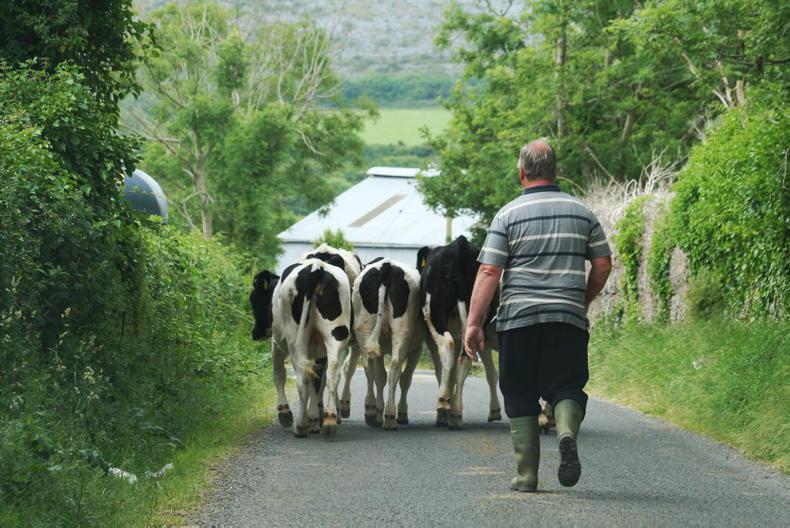The best way to navigate a will involving a farm is through talking, according to agri solicitor Aisling Meehan.
Speaking at the IFA’s recent farm succession meeting in Cork, she suggested that while parents don’t have to have a “full and frank disclosure” of their plans, “sounding them out” with their children can prevent heartache down the line.
“It’s a one-pager and the heartache that that can prevent and the tax efficiency that that can help with is immense,” she said.
Importance
The agri-solicitor told farmers that making a will and communicating it to your children during your lifetime is hugely important to avoid conflict.
“They mightn’t be happy with the decision. They might jump up and down initially and call you every name under the sun, but they’ll learn to live with it and they’ll respect it.
“Compare that with a situation which I come across regularly. It’s absolutely heartbreaking where someone comes, a will has been read, they had an expectation.
“What was in the will is something completely different and they’re absolutely heartbroken. Unfortunately, the only person who can explain what was in the will or why they did the thing is now 12ft under the ground.
“The effect that has on someone’s mental health on a long-term basis can be catastrophic. They start questioning – ‘was I not the favourite, who was the favourite, am I as capable as my brother or sister, maybe they didn’t like my partner, maybe they weren’t of sound mind, maybe someone bundled them into a car and brought them off to a solicitor and they didn’t know what they wrote’ – I’ve heard all sorts of things.
“If you say what you’re thinking of doing, well then now they’re clear in what their expectations are going to be,” she suggested.
Meehan also warned that a will needs to be “fair” for the farm successor.
“If you’ve someone who’s gone to ag college, they come home, they’re mad for farming, they’re mad to get going, be it a son or a daughter, niece or nephew, they need to know where they’re going. They can’t be left in limbo.
“This idea of ‘ah wait, it’s there for you, it’s coming’ and they’re 50 or 60 years of age and their own kids are coming up, what good is it to them? They can’t borrow, they can’t modernise. They don’t know if they’re coming or going.”
Meehan argued that in a making a will, the value of the farm should not be looked at, but instead its income generating capacity. “Ultimately, it has to remain a viable farm for whoever takes it on. I find sometimes, non-farming kids can have unrealistic expectations as to what they’re entitled to. Whoever takes on the farm shouldn’t be expected to supplement [their siblings’ expectations] out of their own non-farm income,” she said.
Asset
She said that non-farming children also sometimes look at a farm as an asset which could be sold.
“In this day and age, if a child gets a farm, they have that emotional connection and attachment to the farm, they grew up with it, it’s the last thing they’d want to do is sell the farm.”
In looking after other non-farming family members, Meehan said that while lump sums were often used in the past, they’ve fallen out of favour.
“Typically, the farm [successor] can’t afford to give lump sums to other family members and I suppose, now kids have pretty good educations, typically they’re well cared for.
“I look at whether other family members are settled, do they have houses, where are they living, how long, do they have kids, are they married?

The large crowds that attended the IFA farm succession information meeting in Co Cork. \ Donal O'Leary
“Typically, when the house and the farm transfers over, there is some sort of a cash sum payment to the other family members, not necessarily the market value of the house,” she added.
The solicitor highlighted that in handing over a farm through a will or in a lifetime farm transfer, there often needs to be a support and maintenance agreement in place for the parents or surviving parent. “The main thing is that there would be an income stream back to the parents in terms of a support and maintenance payment for as long as the parents are alive.”

Solicitor Aisling Meehan. \ Donal O' Leary
Meehan said that in determining this income stream, the amount parents need to live comfortably, what the inheriting child can afford to pay and what the farm generates need to be taken into account.
“There’s no point in parents saying I want back €20,000 a year when the most the farm generated was €10,000 a year,” she added.
Meehan described how that a right of residence can be provided for in a will but from a tax point of view, it’s more tax efficient to transfer the house at the same time as the land because the house can qualify for agricultural relief.
For those seeking to hold back a house or gift it to a non-farming child, the solicitor said parents need to consider whether, if the house was sold to a non-farming outsider, could there potentially be issues around farm sounds and smells which eventually could interfere with the running of the farm? “Then the parents can say, how are we going to provide for other family members, if they get the land and the house?
“That’s where that money can come in. We can say right we’ll transfer the house and the farm on condition that a farmer’s son or daughter gives X amount of money to brothers and sisters.
“Well, that’s regarded as a gift from the parents to the kids, rather than from a brother or sister.”

Solicitor Aisling Meehan. \ Donal O' Leary
Meehan, who advised that a will takes as little as two to three hours’ work with a solicitor, urged farmers to “make your will based on the here and now”.
“It’s a very, very simple thing to do and a lot of the time if people come in and they say ‘if I’d known it’d be that easy, I would have done it years ago’, so there’s no need for big reams of paperwork.
“If you’ve young kids under 18, it’s a very standard will, you put in a discretionary trust for the benefit of the kids. If your kids are over 18, then you need to look at, well who am I leaving it to,” she concluded.
Read more
Fair Deal Scheme: what you need to know
Farmers ‘petrified’ of Sinn Féin tax changes
Surge in farmer interest in pre-nuptial agreements
The best way to navigate a will involving a farm is through talking, according to agri solicitor Aisling Meehan.
Speaking at the IFA’s recent farm succession meeting in Cork, she suggested that while parents don’t have to have a “full and frank disclosure” of their plans, “sounding them out” with their children can prevent heartache down the line.
“It’s a one-pager and the heartache that that can prevent and the tax efficiency that that can help with is immense,” she said.
Importance
The agri-solicitor told farmers that making a will and communicating it to your children during your lifetime is hugely important to avoid conflict.
“They mightn’t be happy with the decision. They might jump up and down initially and call you every name under the sun, but they’ll learn to live with it and they’ll respect it.
“Compare that with a situation which I come across regularly. It’s absolutely heartbreaking where someone comes, a will has been read, they had an expectation.
“What was in the will is something completely different and they’re absolutely heartbroken. Unfortunately, the only person who can explain what was in the will or why they did the thing is now 12ft under the ground.
“The effect that has on someone’s mental health on a long-term basis can be catastrophic. They start questioning – ‘was I not the favourite, who was the favourite, am I as capable as my brother or sister, maybe they didn’t like my partner, maybe they weren’t of sound mind, maybe someone bundled them into a car and brought them off to a solicitor and they didn’t know what they wrote’ – I’ve heard all sorts of things.
“If you say what you’re thinking of doing, well then now they’re clear in what their expectations are going to be,” she suggested.
Meehan also warned that a will needs to be “fair” for the farm successor.
“If you’ve someone who’s gone to ag college, they come home, they’re mad for farming, they’re mad to get going, be it a son or a daughter, niece or nephew, they need to know where they’re going. They can’t be left in limbo.
“This idea of ‘ah wait, it’s there for you, it’s coming’ and they’re 50 or 60 years of age and their own kids are coming up, what good is it to them? They can’t borrow, they can’t modernise. They don’t know if they’re coming or going.”
Meehan argued that in a making a will, the value of the farm should not be looked at, but instead its income generating capacity. “Ultimately, it has to remain a viable farm for whoever takes it on. I find sometimes, non-farming kids can have unrealistic expectations as to what they’re entitled to. Whoever takes on the farm shouldn’t be expected to supplement [their siblings’ expectations] out of their own non-farm income,” she said.
Asset
She said that non-farming children also sometimes look at a farm as an asset which could be sold.
“In this day and age, if a child gets a farm, they have that emotional connection and attachment to the farm, they grew up with it, it’s the last thing they’d want to do is sell the farm.”
In looking after other non-farming family members, Meehan said that while lump sums were often used in the past, they’ve fallen out of favour.
“Typically, the farm [successor] can’t afford to give lump sums to other family members and I suppose, now kids have pretty good educations, typically they’re well cared for.
“I look at whether other family members are settled, do they have houses, where are they living, how long, do they have kids, are they married?

The large crowds that attended the IFA farm succession information meeting in Co Cork. \ Donal O'Leary
“Typically, when the house and the farm transfers over, there is some sort of a cash sum payment to the other family members, not necessarily the market value of the house,” she added.
The solicitor highlighted that in handing over a farm through a will or in a lifetime farm transfer, there often needs to be a support and maintenance agreement in place for the parents or surviving parent. “The main thing is that there would be an income stream back to the parents in terms of a support and maintenance payment for as long as the parents are alive.”

Solicitor Aisling Meehan. \ Donal O' Leary
Meehan said that in determining this income stream, the amount parents need to live comfortably, what the inheriting child can afford to pay and what the farm generates need to be taken into account.
“There’s no point in parents saying I want back €20,000 a year when the most the farm generated was €10,000 a year,” she added.
Meehan described how that a right of residence can be provided for in a will but from a tax point of view, it’s more tax efficient to transfer the house at the same time as the land because the house can qualify for agricultural relief.
For those seeking to hold back a house or gift it to a non-farming child, the solicitor said parents need to consider whether, if the house was sold to a non-farming outsider, could there potentially be issues around farm sounds and smells which eventually could interfere with the running of the farm? “Then the parents can say, how are we going to provide for other family members, if they get the land and the house?
“That’s where that money can come in. We can say right we’ll transfer the house and the farm on condition that a farmer’s son or daughter gives X amount of money to brothers and sisters.
“Well, that’s regarded as a gift from the parents to the kids, rather than from a brother or sister.”

Solicitor Aisling Meehan. \ Donal O' Leary
Meehan, who advised that a will takes as little as two to three hours’ work with a solicitor, urged farmers to “make your will based on the here and now”.
“It’s a very, very simple thing to do and a lot of the time if people come in and they say ‘if I’d known it’d be that easy, I would have done it years ago’, so there’s no need for big reams of paperwork.
“If you’ve young kids under 18, it’s a very standard will, you put in a discretionary trust for the benefit of the kids. If your kids are over 18, then you need to look at, well who am I leaving it to,” she concluded.
Read more
Fair Deal Scheme: what you need to know
Farmers ‘petrified’ of Sinn Féin tax changes
Surge in farmer interest in pre-nuptial agreements












SHARING OPTIONS